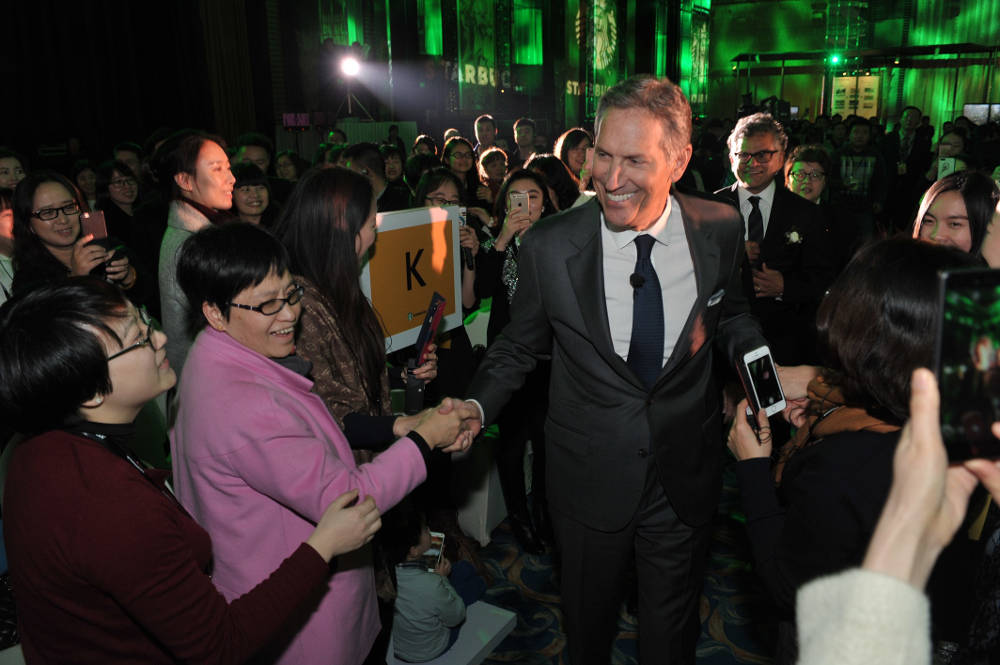[Photograph: Starbucks China Partner Family Forum 2016]
Four years ago, my Chinese friend Grace was looking for an English name for her one-year-old son. “What do you think of Steve?” she asked me. “Why Steve?” I asked, puzzled. There’s nothing wrong with the name except for the fact that Grace’s husband is called Steven. “Well, I like Steve Jobs,” she said. “And I hope someday my son can be as great as him.”
There was no further discussion. Today Grace, Steven and Steve are a happy family.
Steve has been one busy little boy in all the five years of his existence. At the age of one his doting parents (and grandparents) were taking him to dance classes, music classes, painting classes and a gym for toddlers. Grace invested in a piano and hired a piano teacher so he could learn to play what she considers a sophisticated music instrument. Holiday destinations are planned with Steve’s experiences in mind: “What can he learn during this trip?” She constantly scouts for overseas schools, hoping that Steve can finish his primary education in the US or Australia, thus making it easier for him to go to a college there.
More recently the family—parents, grandparents and the nanny—has shifted from their own apartment in Beijing’s central business district to a rented flat on the capital’s outskirts just so that Steve can live within the radius of a certain international school and thus qualify to study there. The move has disrupted the entire family’s lives. The grandparents are now far from their friends and support circle. Grace and her husband have to travel long distances to get to work, which ironically is close to the apartment they own. Instead of traveling for 20 minutes to get to office, Grace now spends close to two hours on the subway, changing five subway trains.
Yet she seems happy. Because obviously all the effort that they are making will bring Steve closer to being the next Steve Jobs.
Now let’s fast forward a few years. What if Steve, all grown up now, announces that he wants to become a barista at Starbucks? Grace would be crestfallen, to say the least.
Don’t get me wrong. There’s nothing shameful in becoming a barista. But in China the child—in most cases the only child—carries the aspirations of the parents and two sets of grandparents. And after all the effort that everyone’s put in, they expect spectacular results. Research confirms that these attitudes exist both in Asian families as well as the diaspora. “…Occupations in traditional Asian cultures are viewed as both individual and family accomplishments. Therefore, decisions regarding careers are usually reflective of collectivist values in Asian culture,” writes Arpita Ghosh at the University of Wisconsin-Milwaukee, in a dissertation paper titled ‘Asian Parents and their College Age Children: Examining Family Influence on Careers’. “Asian American might choose their career based on their family’s mission rather on their own interests,” writes Qin Xuhua, a psychologist at Tufts University and a PhD from University of Illinois at Urbana-Champaign.
This also presents a big problem for companies in China whose job roles don’t fit into the traditional notions of a good career choice that will make Mama happy. The obvious examples are frontline staff at McDonald’s and baristas at Starbucks. Being a barista at Starbucks requires a lot of skill but not a fancy degree.
Starbucks CEO Howard Schultz recognizes this problem. And so Starbucks, which counts China as its second-largest and fastest-growing market, has found a creative solution to make sure that families of staffers are on board. Since 2012 Starbucks has held four Partner Family Forums in China in the cities of Beijing, Shanghai, Guangzhou and Chengdu. The latest one in Chengdu saw 1,300 partners and their families attend the event. The crowd at the Partner Family Forums typically includes Starbucks staff, their children, parents and sometimes grandparents. In a 2012 BCG Perspectives interview, Schultz explained: “Think about an annual meeting of shareholders; we had an annual meeting of parents in Beijing and Shanghai, and we had about 90% participation. We did not know who or how many would come. In most cases, there were whole families. There were parents, grandparents, aunts, and uncles. It was unbelievable.”
The family forum is a way of reaching out potentially to families like Grace’s who would rather have Steve working as a top-flight scientist rather than a barista brewing a cup of joe. It is meant to educate all the stakeholders in an employee’s life and instil in them a sense of pride about Starbucks, the company. In his speech, Schultz addressed the parents: “…I promise you (the parents of Starbucks partners) we will grow this company the right way. …We will do everything we can to continue to build a great and enduring company that you and your parents can be proud of.”
In this year’s family forum, Starbucks doled out even more goodies aimed at allaying the family’s insecurities. Full-time baristas and shift supervisors have been given “a monthly housing allowance subsidy to help them overcome the initial financial challenges of starting their careers and often, living and working independently”. This should cover roughly half their monthly housing expenditures. In addition, staff with 10 years of service are eligible for one-year sabbaticals, called “career coffee breaks”.
Another company—a local pizza chain called Gung Ho Pizza—does some interesting things for employees. After working in the big cities for a long time, employees are often under pressure from their families to return home. Each time an employee finishes five years at Gung Ho Pizza, the company’s co-owner Jade Gray travels with him back to his native village, no matter how far that is. He meets the parents, spends time with them and also gifts them an envelope full of money. For the parents it is a matter of pride and Gung Ho is able to keep its retention rates high. “Until I engage them and pitch to them why I think it’s in the interest of the family for their child to stay with me, then I’d never get a retention rate that’s going to allow me to grow,” Gray told the BBC. “So now I go back to their home town, and a huge part of it is really to get the buy-in of the family.”
It would be interesting to see what Steve would become when he grows up. But as long as there are Howard Schultzes and Jade Grays, my friend would be happy.

